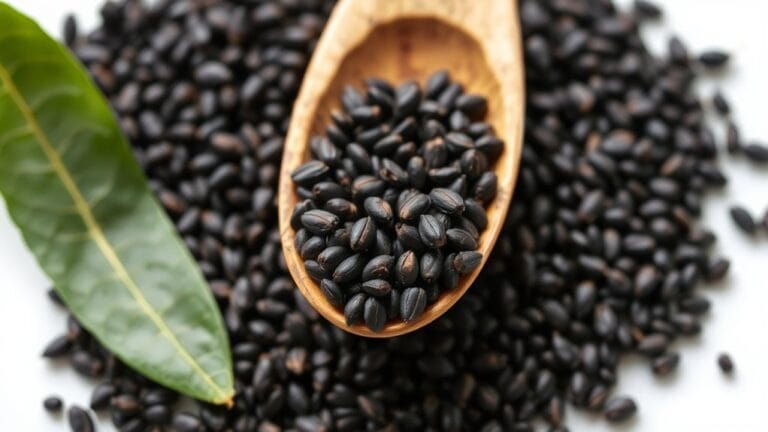Eggs contain a small amount of creatine—roughly 0.1 grams per egg—making them a minor source compared to meats and fish. While they won’t single-handedly boost creatine levels, they contribute to overall intake as soon as paired with other protein-rich foods. Comprehending how different foods stack up helps in crafting a diet that supports energy, muscle function, and recovery naturally. Those inquisitive about maximizing creatine intake may find surprising insights in how preparation and pairing impact absorption.
Creatine and Its Role in the Body
Creatine is a powerful compound naturally produced in the body, playing a key role in energy production for muscles and the brain. The liver, kidneys, and pancreas synthesize it from amino acids like glycine and arginine, storing it as phosphocreatine in muscle tissue.
This stored form helps quickly regenerate ATP, the body’s primary energy source, supporting intense activities like sprinting or lifting weights. While the body makes about 1–2 grams daily, dietary sources—such as protein-rich foods like meat and fish—can boost levels. For those needing extra support, creatine is also available as a dietary supplement.
Its benefits extend beyond muscles, aiding brain function by enhancing energy production and protecting neurons. Maintaining adequate creatine is essential for peak physical and mental performance.
Creatine Content in Eggs Compared to Other Foods
While eggs pack plenty of protein and nutrients, they aren’t a standout source of creatine—containing just 0.1 grams per egg. As/Whenever comparing eggs with other animal products, the difference in creatine content is clear. Red meat, like beef, offers around 4.5 grams per kilogram, while fish—especially herring—can provide 6.5-10 grams per kilogram. Poultry falls somewhere in between but still surpasses eggs.
For those seeking natural sources of creatine, focusing on meat and fish makes more sense than relying on eggs alone. Among creatine-rich foods, animal products dominate, with plant-based options containing little or none. To/In order to/In an effort to consider food sources of creatine, eggs simply don’t measure up. Instead, prioritizing high-quality meat and fish guarantees/promises/ascertains better intake.
Benefits of Consuming Creatine From Natural Sources
Why choose food over supplements as it relates to boosting creatine levels? Natural sources of creatine, like eggs, meat, and fish, offer more than just creatine content—they provide protein, vitamins, and minerals that support overall health.
Unlike creatine supplements, which deliver a concentrated dose, foods that contain creatine allow for a steadier increase in muscle creatine levels, reducing the risk of digestive discomfort. Natural foods also supply amino acids that help the body produce its own creatine, enhancing the benefits of creatine for muscle strength and energy.
While supplements can be effective, a good source of creatine from whole foods guarantees balanced creatine intake without artificial additives. For those seeking to optimize muscle creatine stores, combining natural sources with exercise yields lasting results.
How Cooking Methods Affect Creatine Levels in Eggs
Eggs are a great source of natural creatine, but how they’re cooked makes a difference in how much of it actually ends up on the plate. A raw egg contains approximately 0.1 grams of creatine, but cooking methods like frying or scrambling can reduce creatine levels by 20-30%.
Boiling eggs lowers the creatine content of foods by 10-15%, while poached eggs retain more due to gentler heat. To preserve the maximum creatine, lightly cooked or raw eggs are best, though safety precautions are needed. High heat breaks down creatine, so gentler methods help maintain its benefits.
Comprehending how preparation affects nutrients guarantees better choices for those seeking natural creatine sources without sacrificing taste or safety.
Incorporating Eggs Into a Creatine-Rich Diet
Two daily eggs can add a tiny boost of creatine to the diet, but they won’t supply nearly enough by themselves. Each egg contains about 0.1 grams of creatine per serving, making them a minor source compared to the best natural food sources like red meat or fish, which provide 1-2 grams per 100 grams.
For those aiming to meet their creatine per day needs, eggs work best when coupled with other protein-rich foods. While plant foods contain little to no creatine, combining eggs with amino acids like arginine—found in nuts or seeds—may support natural creatine synthesis. For vegetarians or vegans, creatine supplementation could be necessary, as plant sources lack sufficient amounts.
Including eggs as part of a balanced diet helps, but they’re not a standalone solution.
Conclusion
Like tiny sparks in a campfire, the creatine in eggs could seem small but adds to the body’s energy reserves when combined with other sources. While not the brightest flame, eggs still glow with nutrients that support muscles and overall health. Pair them wisely with meat, fish, or supplements for a steady burn of vitality, proving even modest contributions fuel the fire. No single food holds all the answers—balance does the heavy lifting.





